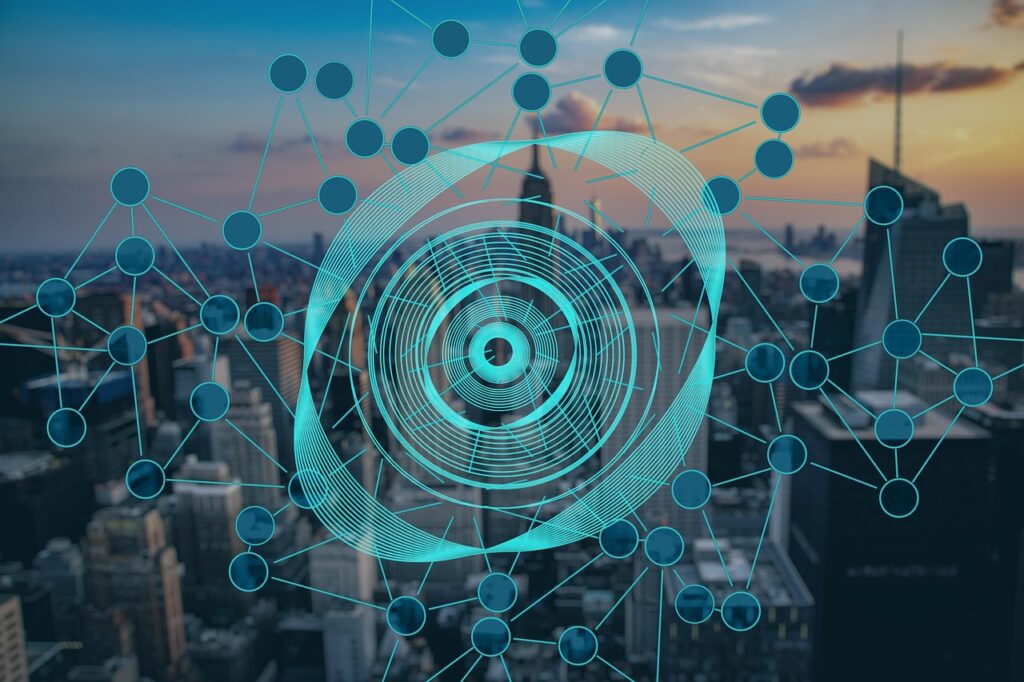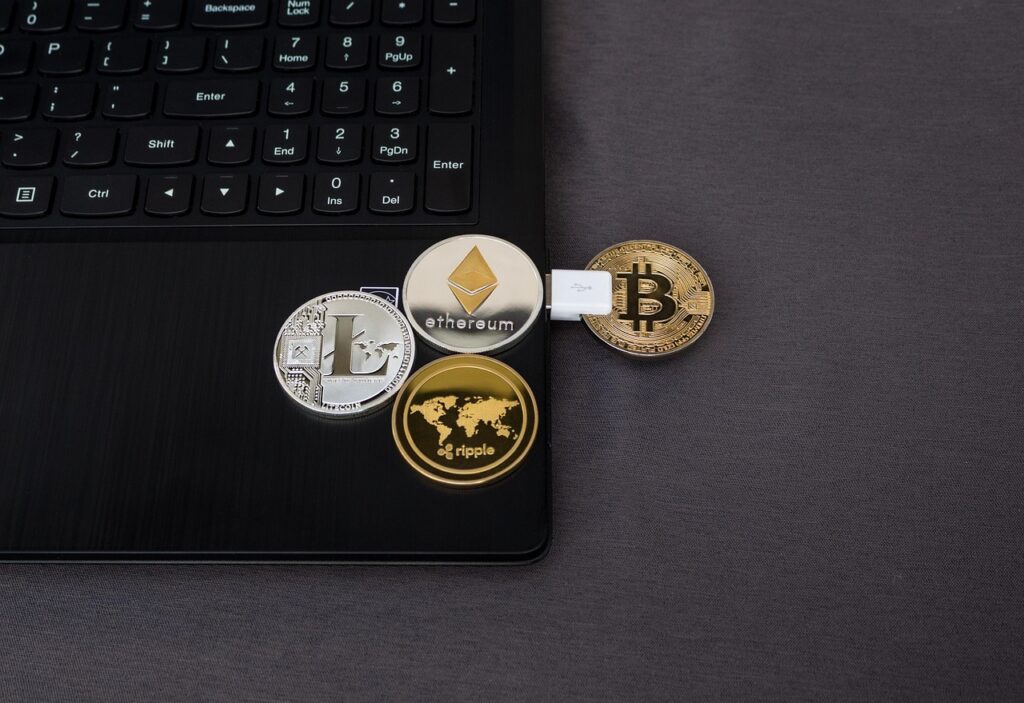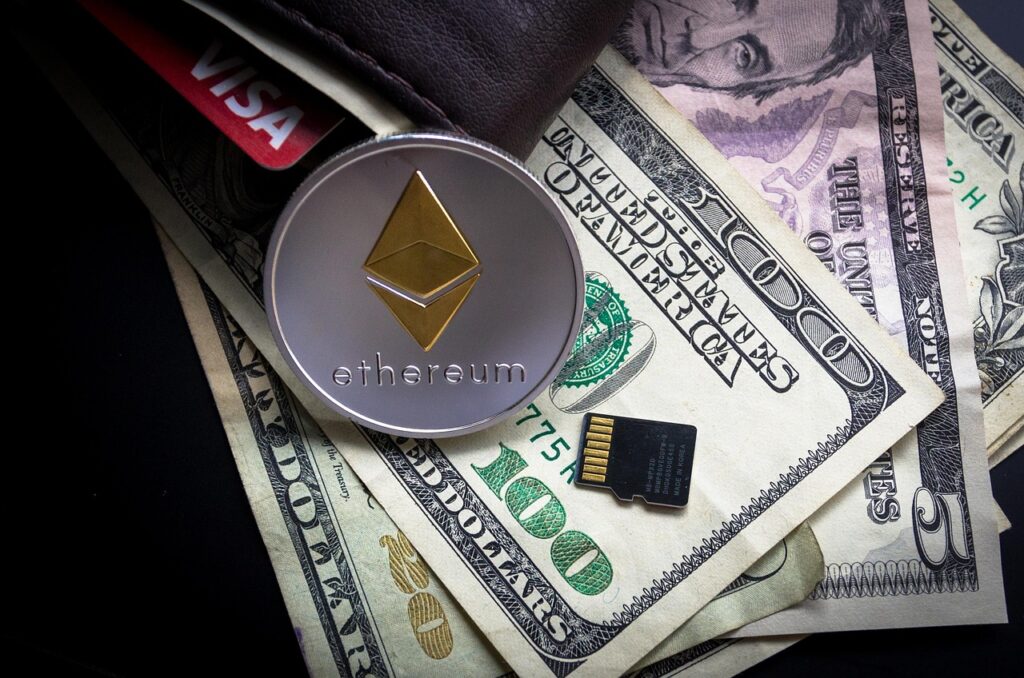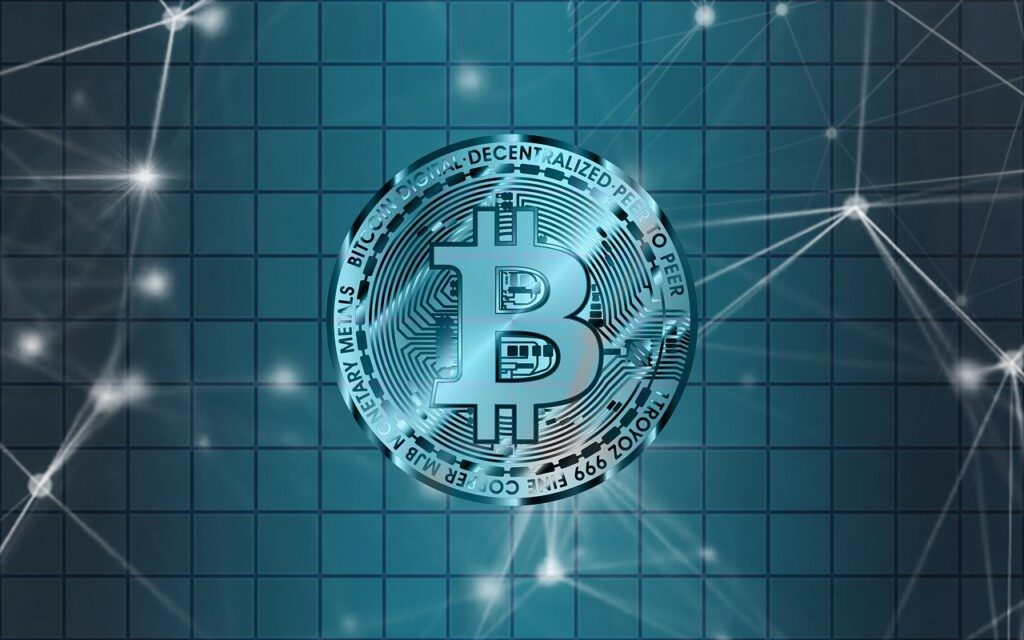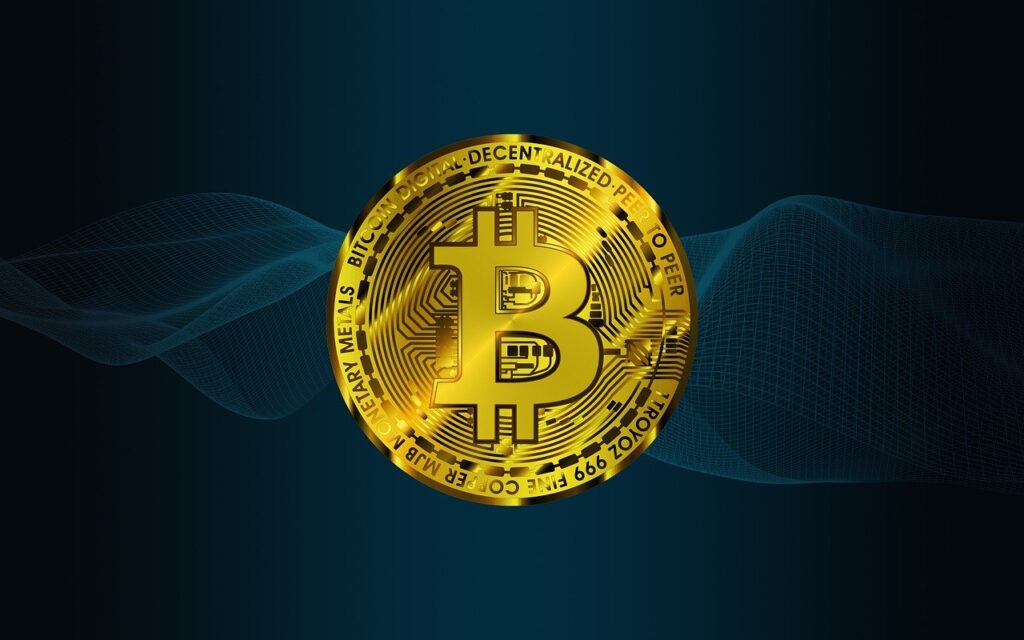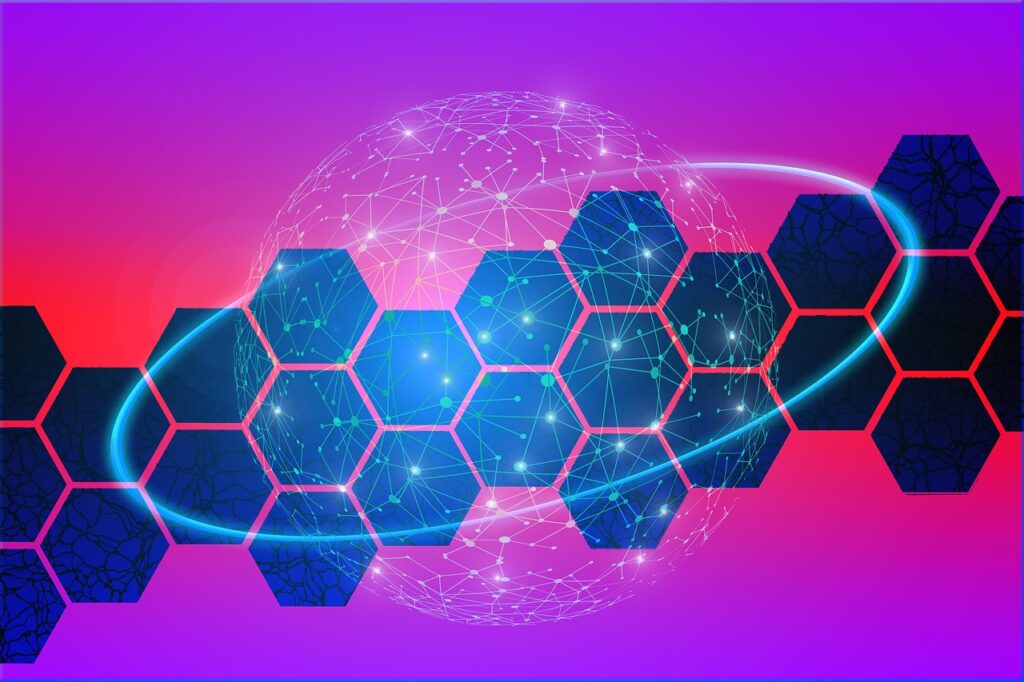The gaming world has changed a lot over the years, from simple pixel games to amazing virtual realities. Each step forward has made games more fun. Now, something new is happening: blockchain. This tech is shaking things up, giving players more control and opening up new ways to earn. It’s not just about playing anymore; it’s about owning and being part of the game’s economy. This article will look at how blockchain revolutionized the gaming industry and what that means for everyone involved.
Table of Contents
- 1 Blockchain’s Impact on Gaming and Beyond
- 2 True Digital Ownership: NFTs and In-Game Asset Control
- 3 Play-to-Earn (P2E): Monetizing Gameplay
- 4 Decentralized Game Economies: Transparent and Fair Systems
- 5 Interoperability: Cross-Platform Asset Utilization
- 6 Enhanced Security: Protecting Players and Data
- 7 Smart Contracts: Automating Game Mechanics
- 8 Decentralized Autonomous Organizations (DAOs): Community-Driven Development
- 9 Funding and Crowdfunding: New Models for Game Development
- 10 The Metaverse: Expanding Virtual Realities
- 11 Challenges and Risks: Navigating the Blockchain Gaming Landscape
- 12 Beyond Gaming: Blockchain’s Influence on Other Industries
- 13 Supply Chain Management
- 14 Healthcare
- 15 Finance
- 16 Voting Systems
- 17 Intellectual Property Protection
- 18 Frequently Asked Questions
- 19 What exactly is blockchain gaming?
- 20 How does blockchain technology help video games?
- 21 What are NFTs in gaming, and why are they important?
- 22 How does ‘Play-to-Earn’ work in blockchain games?
- 23 Can I use my game items in different blockchain games?
- 24 Are there any downsides or challenges to blockchain gaming?
- 25 What does the future hold for blockchain in the gaming industry?
- 26 Is blockchain only used in gaming, or does it affect other industries?
Blockchain’s Impact on Gaming and Beyond
Blockchain tech is shaking things up, and gaming is one of the first industries to feel the impact. It’s not just about new games; it’s about changing how games are made, played, and even owned. Blockchain is bringing decentralization, digital ownership, and new economic models to the forefront.
Think about it: for years, you’ve been buying stuff in games that you don’t own. The game company can take it away anytime. Blockchain changes that. It’s also opening doors for players to earn money while playing, and even have a say in how the games are developed. It’s a big shift.
Here’s a quick rundown of what blockchain is bringing to the table:
- True ownership of in-game items.
- New ways to earn money while playing.
- More transparent and fair game economies.
- Increased security for in-game transactions.
Blockchain’s impact goes beyond just making games more fun. It’s about giving players more control, creating new economic opportunities, and building more transparent and trustworthy gaming ecosystems. It’s still early days, but the potential is huge.
AI enhances blockchain by improving smart contracts and dApps. The implementation of Blockchain in gaming is a game-changer. It’s also expanding market opportunities. It’s changing how blockchain is used in the gaming industry and beyond.
True Digital Ownership: NFTs and In-Game Asset Control
Okay, so one of the coolest things blockchain brings to gaming is actual ownership. I mean, think about it: all those skins, swords, and characters you grind for in games? Usually, you don’t own them. The game company does. Blockchain changes that.
With NFTs (Non-Fungible Tokens), those in-game items become unique, provably rare assets that you control. It’s like having a deed to your virtual property. This opens up a whole new world of possibilities.
- True digital ownership is achieved through NFTs, giving players control over their in-game assets.
- NFTs ensure the authenticity and scarcity of digital items.
- Players can trade, sell, or even use their assets across different compatible games (eventually!).
It’s a shift from renting to owning. Imagine buying a sword in one game and then being able to use it (or sell it!) in another. That’s the promise of blockchain gaming.
It’s not all sunshine and roses, though. There are some hurdles to overcome. But the idea of truly owning your digital stuff? That’s a game-changer.
Play-to-Earn (P2E): Monetizing Gameplay
The play-to-earn (P2E) model has really shaken things up in the gaming world. Instead of just playing for fun, players can earn real money. It’s like turning your hobby into a side hustle, or even a full-time job for some. This shift is powered by blockchain tech, which lets players own their in-game assets and trade them. It’s a pretty big deal.
One of the coolest things about P2E is how it changes the relationship between players and game developers. Players aren’t just consumers anymore; they’re active participants in the game’s economy. This can lead to more engaged communities and more sustainable game economies. But it’s not all sunshine and rainbows. There are challenges, like dealing with volatile crypto markets and making sure the games are fun to play, not just a grind for cash. Labor is rewarded with cryptocurrencies or NFTs.
P2E games have opened up opportunities, especially in developing countries, by providing financial inclusion for those without access to traditional banking systems. It’s not a perfect system, but it’s a step towards a more equitable gaming landscape.
Here’s a quick look at some of the pros and cons:
- Pros:
- New income streams for players
- Increased player engagement
- Potential for more sustainable game economies
- Cons:
- Volatility of crypto markets
- Risk of “grindy” gameplay
- Regulatory uncertainty
Axie Infinity is a prime example of a P2E game that gained massive popularity. Players breed, battle, and trade digital creatures called Axies, which are NFTs. During its peak, some players in the Philippines were earning more from Axie Infinity than they would from a typical monthly salary. It shows the potential of play-to-earn games.
Decentralized Game Economies: Transparent and Fair Systems
Blockchain tech is changing how game economies work. Instead of everything being controlled by the game company, blockchain lets players have a real stake in the game’s financial system. This means more transparency and, ideally, a fairer experience for everyone involved.
Blockchain introduces a decentralized economy into gaming where players can earn and spend real money within and across various games.
Think about it: in traditional games, you spend money on items that have no value outside the game. With blockchain, those items can be NFT models that you can trade or sell. This creates a whole new dynamic.
- Transparency: All transactions are recorded on the blockchain, so everyone can see what’s happening. No more hidden fees or unfair practices.
- Fairness: Because the rules are coded into smart contracts, they can’t be changed arbitrarily by the game company. This gives players more confidence that the game is being run fairly.
- Player Empowerment: Players have more control over their assets and can participate in the game’s economy in meaningful ways.
It’s not all sunshine and roses, though. These new economies also bring new challenges. Things like token volatility and the need for clear regulations are important hurdles that need to be addressed for widespread adoption.
Interoperability: Cross-Platform Asset Utilization
Okay, so imagine you’ve spent hours grinding in one game, finally snagging that super rare sword. Wouldn’t it be cool if you could use that same sword in a completely different game? That’s the promise of interoperability, and blockchain is making it a reality. It’s all about letting you use your digital stuff across different platforms.
Think of it like this: you buy a song on one music platform, and you can usually listen to it on any device. Blockchain wants to do the same thing for in-game items and other digital assets. It’s still early days, but the potential is huge.
- More value for players: Your digital assets aren’t stuck in one game.
- New revenue streams for developers: They can collaborate and create interconnected experiences.
- Increased player engagement: Players are more invested when their items have broader utility.
It’s not just about games either. Imagine using the same digital avatar across different metaverse platforms, or even in virtual meetings. The possibilities are pretty wild.
Standards like ERC-721 and ERC-1155 are key to making this happen. They set the rules for how NFTs work, making it easier for different games and platforms to recognize and use them. It’s like having a universal adapter for your digital stuff. While we’re not quite at the point where you can take your Fortnite skin into Minecraft, the tech is moving in that direction. Imagine the possibilities for inter-game interoperability!
It’s a complex challenge, but the potential rewards are massive. A truly interconnected digital world where your assets have real value and utility, no matter where you are. That’s the dream, and blockchain is helping to build it.
Enhanced Security: Protecting Players and Data
One of the biggest benefits of integrating blockchain into gaming is the increased safety it provides. We’re talking about protecting players and their stuff, which is a huge deal. Think about it: all those in-game items, accounts, and even personal info are way more secure now.
Blockchain’s decentralized nature makes it super tough for hackers to mess with things. It’s like trying to break into a million different houses at once – not gonna happen. Plus, all those transactions and ownership records? They’re all safe and sound on the blockchain’s record, so no one can cheat or steal your stuff. It’s a big win for fair play and keeping your digital goodies safe.
It’s not just about stopping hackers, though. Blockchain also helps make sure everyone plays fair. With everything recorded on the blockchain, it’s way easier to spot cheaters and keep the game honest. That’s a big deal for competitive games and esports, where fairness is everything.
Here’s a quick rundown of how blockchain boosts security:
- Encryption: Keeps your data safe from prying eyes.
- Decentralization: Makes it hard for anyone to control or mess with the system.
- Transparency: It lets you see what’s going on and ensures everyone plays by the rules.
Blockchain is like a super-powered security guard for the gaming world. It’s not perfect, but it’s a whole lot better than what we had before.
Smart Contracts: Automating Game Mechanics
Smart contracts are self-executing agreements written into code. Think of them as tiny programs stored on a blockchain that automatically execute when specific conditions are met. This automation is a game-changer for the gaming industry, removing the need for intermediaries and creating trustless interactions.
Imagine a scenario where a player wins a tournament. Instead of waiting for a game admin to manually process the reward, a smart contract automatically distributes the prize as soon as the victory condition is verified on the blockchain. Pretty cool, right?
Here’s how smart contracts are making waves:
- Automated Tournaments and Rewards: Smart contracts can manage tournament entries, track scores, and distribute prizes automatically, ensuring fairness and transparency.
- Provably Fair Randomness: For games that rely on chance, smart contracts can generate truly random numbers, eliminating any suspicion of manipulation.
- Dynamic In-Game Events: Smart contracts can trigger in-game events based on real-world data or predefined conditions, creating a more dynamic and engaging experience.
Smart contracts are not just about automation; they’re about creating a more trustworthy and transparent gaming environment. They allow developers to build complex game mechanics that are verifiable and tamper-proof, fostering greater player confidence.
Smart contracts also facilitate the creation of unique in-game items. For example, a blockchain’s transparency ensures that every transaction is recorded and verifiable, reducing the risk of fraud. This is especially important for games with valuable in-game assets.
Decentralized Autonomous Organizations (DAOs): Community-Driven Development

DAOs are changing how games are made and managed. Instead of a single company calling all the shots, DAOs let the community get involved. This means players can have a real say in the future of their favorite games. It’s a big shift from the traditional model.
Think of it like this:
- Players vote on new features.
- Token holders decide where the game is going.
- The community helps fund development.
DAOs are not without their challenges. Getting everyone to agree can be tough, and making sure the DAO is run fairly takes work. But the potential for more engaging and community-focused games is huge.
DAOs are funded in different ways, including early token sales and grants. This money is then used to improve the game and support the community. It’s a new way of thinking about game development, where the players are also the owners.
Funding and Crowdfunding: New Models for Game Development
Blockchain tech has seriously shaken up how games get made and funded. Forget begging publishers for cash; now, developers have a bunch of new ways to get their projects off the ground. It’s not just about money, though. It’s about building communities and getting players involved from the start.
Blockchain is changing the game for funding video games.
- Initial Coin Offerings (ICOs): Remember the crypto boom? Game devs jumped on that, launching their tokens to fund development. It’s like a Kickstarter, but with crypto. It can be risky, but the potential is huge.
- NFT Sales: Selling unique in-game items as NFTs before the game even launches? Genius! Players get something cool, and devs get upfront funding. Win-win.
- Decentralized Autonomous Organizations (DAOs): DAOs are like online co-ops where everyone gets a say. They can pool funds and vote on which games to support. Talk about community-driven development!
It’s the wild west out there, though. Not every project is legit, and regulations are still catching up. Do your research before throwing your money at the next big blockchain game.
Think about it: traditional game funding is all about pitching to a few big companies. Now, anyone with a cool idea can pitch to the whole internet. It’s democratizing game development, and that’s pretty awesome.
For example, to launch a cryptocurrency for your game, you’ll need to decide if you want to build a new blockchain or use an existing one. Then, you’ll need to design the tokenomics, including supply, distribution, and utility.
The Metaverse: Expanding Virtual Realities
The metaverse is like the next level of the internet, and blockchain tech is helping to build it. Think of it as a shared digital world where you can do pretty much anything – play games, attend events, work, or just hang out. Blockchain brings some cool stuff to the table, like letting you own your digital stuff and making sure things are fair and transparent.
Blockchain is making the metaverse more real and useful.
- It lets you own digital land and items as NFTs.
- It helps create secure and fair economies within these virtual worlds.
- It makes it easier to move your stuff between different metaverse platforms.
The metaverse is still pretty new, but it has the potential to change how we interact with each other and the digital world. Blockchain is a key part of making that happen by giving us more control and ownership over our virtual lives.
Okay, so blockchain gaming sounds cool, right? But it’s not all sunshine and rainbows. There are some bumps in the road that both players and developers need to watch out for. It’s like any new tech – exciting, but also a bit risky.
One of the biggest issues is just how new everything is. Regulations are still catching up, and that can create a lot of uncertainty. Plus, not everyone is thrilled about the idea of cryptos in games. Some gamers worry that it’ll turn their favorite pastime into a money-grabbing scheme. And honestly, some of the early projects haven’t exactly helped that perception. There have been scams and projects that just disappear, leaving players with nothing. It’s enough to make anyone a little skeptical.
Another thing to consider is that blockchain stuff can be complicated. Setting up wallets, understanding gas fees – it’s not always user-friendly. If a game isn’t easy to pick up and play, people just won’t bother, no matter how cool the underlying tech is. And let’s not forget about the environmental impact. Some blockchain networks use a ton of energy, which is a real concern these days. So, while blockchain gaming has a lot of potential, it’s important to go in with your eyes open and be aware of the potential pitfalls.
Beyond Gaming: Blockchain’s Influence on Other Industries
It’s easy to get caught up in the gaming hype, but blockchain’s potential stretches far beyond entertainment. Its core features – transparency, security, and decentralization – are attractive to many sectors. Let’s take a look at how blockchain is making waves in other industries.
Supply Chain Management
Blockchain offers a way to track goods from origin to consumer. This can help verify authenticity, reduce fraud, and improve efficiency. Imagine being able to scan a QR code and see the entire history of your coffee beans, from the farm to your cup. This level of transparency builds trust and accountability. For example, a secure transaction can be recorded on the blockchain.
Healthcare
Securely storing and sharing medical records is a huge challenge. Blockchain could provide a solution by giving patients more control over their data and making it easier for healthcare providers to access information when needed. This could lead to better care and reduced administrative costs.
Finance
Cryptocurrencies are just the tip of the iceberg. Blockchain can streamline payments, reduce transaction fees, and improve security in the financial industry. Smart contracts can automate complex financial agreements, making them more efficient and transparent. Think about international money transfers that take minutes instead of days, with lower fees and increased security.
Voting Systems
Blockchain could make voting more secure and transparent. By recording votes on an immutable ledger, it would be harder to tamper with election results. This could increase trust in the democratic process and encourage more people to participate. It’s a complex issue, but the potential is there.
Blockchain’s impact is still unfolding, but its ability to create trust and transparency is undeniable. As more industries explore their potential, we can expect to see even more innovative applications emerge in the years to come.
Intellectual Property Protection
Protecting copyrights and patents can be difficult in the digital age. Blockchain can provide a way to register and track intellectual property, making it easier to prove ownership and prevent infringement. This could be a game-changer for artists, musicians, and inventors.
Frequently Asked Questions
What exactly is blockchain gaming?
Blockchain gaming is a new way to play video games that uses a special kind of internet technology called blockchain. This technology lets players truly own their in-game items, like special swords or unique characters, and even earn real money by playing. It’s different from regular games where you don’t own anything you buy.
How does blockchain technology help video games?
Blockchain makes games more secure and fair. It keeps a super-safe record of who owns what, so no one can cheat or steal your digital stuff. It also makes it possible to earn money from games and even lets players help decide how games are made.
What are NFTs in gaming, and why are they important?
NFTs, or Non-Fungible Tokens, are like digital certificates of ownership for unique items. In games, an NFT could be a rare skin for your character or a powerful weapon. Because each NFT is one-of-a-kind and recorded on the blockchain, you truly own it, and you can even sell it to other players for real money.
How does ‘Play-to-Earn’ work in blockchain games?
Play-to-Earn, or P2E, means you can earn real money or valuable digital items just by playing games. Instead of just spending money on games, you can now make money by playing them, trading items, or winning contests. It’s a big change in how people think about gaming.
Can I use my game items in different blockchain games?
Blockchain helps make games more open and connected. It allows game items to be used across different games, which wasn’t really possible before. This means if you buy a cool item in one game, you might be able to use it in another, making your digital stuff more valuable.
Are there any downsides or challenges to blockchain gaming?
While blockchain gaming offers exciting new possibilities, there are still some challenges. These include making the technology easy for everyone to use, dealing with the energy it takes to run blockchains, and making sure games are still fun and engaging, not just about earning money.
What does the future hold for blockchain in the gaming industry?
Blockchain technology is still pretty new in gaming, but it’s growing fast. Many experts believe it will become a huge part of the gaming world, changing how games are made, played, and how players interact with them. It could lead to entirely new types of games and player experiences.
Is blockchain only used in gaming, or does it affect other industries?
Yes, blockchain is impacting many other areas too! It’s being used in finance for secure transactions, in supply chains to track products, in healthcare for patient records, and even in art and music for digital ownership. It’s a technology that’s changing many parts of our digital world.

